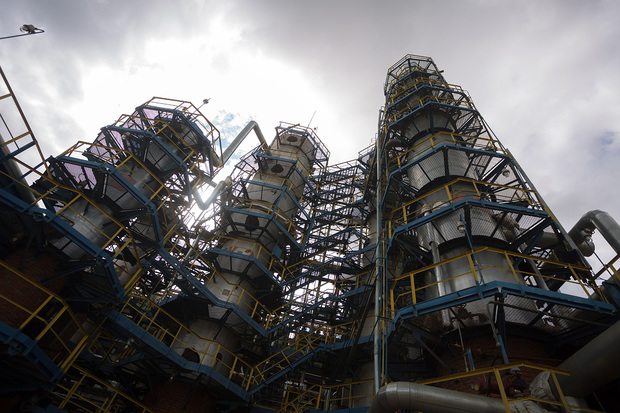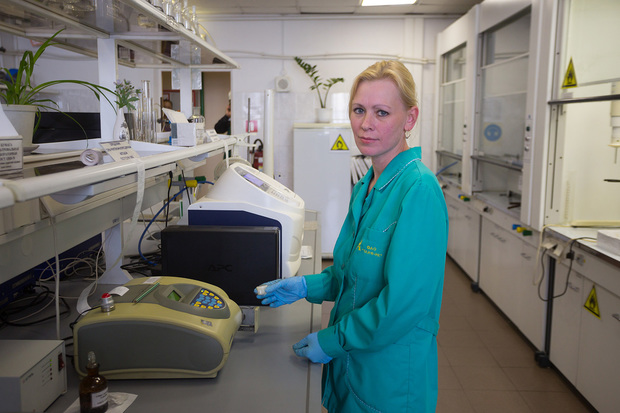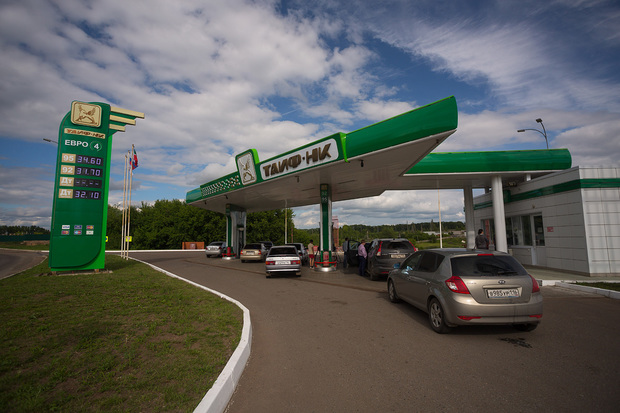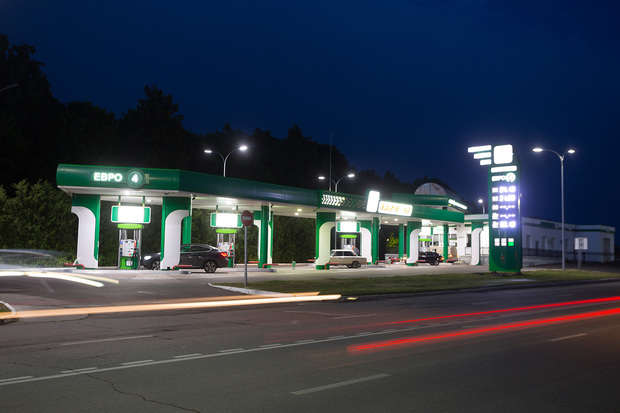21st-century fuel: Euro-5 is a modern gasoline standard
TAIF-NK, one of the largest automotive fuel manufacturer in Tatarstan, plans to adopt gasoline production of a new level
In Russia, from 1 January 2015 the requirements on ecological standards of automotive fuel were raised. Now at petrol stations it has been permitted to sell fuel of ecological class that is not lower than Euro-4, from the next year – only Euro-5. The reason of the qualitative growth of the motor fuel was beginning of the resolution of the government of the Russian Federation. According to this resolution, putting the automotive fuel of the Euro-4 ecological class in circulation is permitted until 31 December 2015. The Realnoye Vremya newspaper found out in the TAIF-NK PJSC, one of the enterprises of the TAIF Group of Companies in Tatarstan that produces gasoline and diesel fuel, what the transition to the ecological Euro-5 gasoline production will require from petroleum refiners and its advantages for consumers.
High standard
The European Union introduced the Euro-3 standard in the 1990s, and literally in 5 years the Eurozone countries started using the ecological Euro-4 fuel. Meanwhile, in Russiathe terms of the transition to the Euro-3, which was planned by the government on 1 January 2009, changed many times on account that the Russian petroleum refining plants couldn't modernize their factories to the deadline. Due to concessions made by the government, many gasoline manufacturers had the opportunity to prolong the adoption of the new fuel standard for 4 years, i.e. till the end of 2013.
What is more, during almost 60 years, from the time when petroleum extraction began in Tatarstan, gasoline in the republic was delivered mainly from our neighbours – Bashkiria and Samara. TAIF-NK PJSC, an offshoot of TAIF, started to build Gasoline Plant in 2003, put it into operation and began to produce Euro-3 in February 2006. The main goal of this factory set by the administration of the Republic of Tatarstan 10 years ago and now is to provide Tatarstan with different types of fuel. The task was fulfilled: today TAIF-NK accounts for 40% of the total volume of consumed automotive fuels in the republic.
In 2007, the government of Russia informed the regional authorities and petroleum refining plants that since 2009 there will be introduced new technical regulations for production of motor fuels. It became a baseline for the introduction of technical and technological innovations in the enterprises of Nizhnekamsk.
TAIF-NK PJSC immediately started the modernization of the Gasoline Plant by virtue of a $500 million syndicated loan and implemented a new technological scheme due to which in 2008 the factory started to produce not only a high-quality gasoline but also the environmentally friendly Euro-4.

Above all, ecology
At the same time, as governmental resolutions state, from 2016 the ecological Euro-4 automotive fuel must be replaced by Euro-5. This gasoline has many advantages. Firstly, the major advantage of Euro-5 is high safety for the environment. It contains less than 10ppm of sulphur compared to the Euro-4 standard whose sulphur content is 50ppm. Additionally, the Euro-5 ecological standard has a lower content of aromatic hydrocarbons. It directly and significantly reduces the emission of harmful substances into the atmosphere. It means that the air we breathe, especially in big cities awash with cars, will be clearer. This fact was proved many times: car exhaust fumes account for 80% of the total volume of the air pollution. In brief, the improving fuel quality has only benefits for the environment.
Today's gasoline as it is
At the present, the current Euro-4 remains popular. This fuel standard has a low percentage of harmful emissions owing to the low sulphur content, which is 3 times smaller than Euro-3's maximal indicators.
The experts of TAIF-NK confirm that the gasolines produced by the manufacturer of Tatarstan thoroughly correspond to the national standard. Every stage of the preparation is under control: to start with, the laboratories study the raw material in detail to produce the fuel. Undoubtedly, the commodity is analysed too. Only after obtaining a special document, a passport, this commodity can pass to the further stage.
Before going to fuel tank, fuel quality is examined. The fuel samples, which are filled up a reservoir at every petrol station of the TAIF-NK chain, are tested on their correspondence to the standards set by the government. What is more, not only their own laboratories check the qualitative parameters of the fuel. The specialists of the Administration of Regional Use of Fuel-Power Resources does tests twice a year.

As for the end result, the gasoline of TAIF-NK PJSC has no soluble gums, which is a guaranteed reduction of deposit formation on the engines and their power increase. A special production technology implemented in TAIF-NK PJSC gives the opportunity to exclude harmful substances such as iron, lead and manganese from gasoline. By the way, benzene content is also reduced. Another advantage of the special recipe is easy engine start even in winter.
Indubitably, high-quality gasoline also prolongs the lifespan of the vehicle, which is one the most important indicators for its owner. Overall, all this definite characteristics of gasolines of TAIF-NK PJSC allowed the company to become a repeated laureate of the '100 Best Products of Russia' All-Russian Competition.
The best for gasoline
The government didn't give much time for the Russian petroleum refining plants to modernize their factories in order to be able to produce Euro-5. TAIF-NK PJSC is among leading oil refining plants that has been studying this issue in detail for 10 months or, more precisely, from February to implement all necessary technological and technical solutions, make a timely transition to the production of the new motor fuel that corresponds to the Euro-5 ecological standard and maintain its reasonable price for car owners. Nowadays technological measures with use of different catalysts and additives are being held whose successful execution will enable to accelerate the process and obtain a result within a short time frame. In addition, after a conversation with the experts of TAIF-NK, there is no doubt that by the end of 2015 the company will be ready for the industrial and large-tonnage production of the Euro-5 environmentally friendly fuel meeting all requirements of the government of Russia in advance and providing car owners with the quality fuel.
By the by, in autumn of 2016 TAIF-NK is going to launch its new brainchild – the Heavy Residues Deep Conversion Complex (HRDCC). The realization of this global project began in 2012. It will produce petroleum products like Euro-5 ecological standard, naphtha, kerosene, purified vacuum gas oil, which is the main raw material for Euro-5 fuel production.
Price is a difficult matter
The main issue that worries almost every car owner is the price for a litre of Euro-5 fuel for the next year. The Antimonopoly Service controls the pricing on the motor fuel market. Moreover, dumping sanctions are stricter than artificial price-hike. What probably influences the price of motor fuel most (almost all experts and analysts are convinced that the growth cannot be avoided) is the price of raw material (petroleum), excise and inflation rate. It is well known that the government sets the amount of the latter.

For instance, in November 2014, some deputies of the State Duma offered to increase rates of excise duties on the Euro-5 gasoline in 2015. On the contrary, most members of the parliamentary decided to reduce them. This new standard is only going to replace the Euro-4. Consequently, they approved the corresponding amendments in the article of the Tax Code of Russia concerning raising tax rates on excisable goods, including gasoline. At the same time, they introduced amendments to the legislation as a 'tax manoeuvre', which reduce export duties on petroleum and petroleum products, but simultaneously increase the Natural Resource Taxation.
As for the influence of the inflation, analysts point out that price for fuel increases, in general, they are equal to the inflation rate of Russia. Not only the Federal Antimonopoly Agency monitors gasoline price at the petrol stations not allowing it to surpass the inflation rate. The Ministry of Energy and other market regulators control it as well, so that the manufacturers do not dare to forecast the price of fuel because of these factors.
Anyway, prices at the petrol stations of TAIF-NK under today's economic conditions are reasonable. Petrol tankers of their own fleet deliver the ready fuel to a petrol station from the factory avoiding intermediary storages on the grounds that stations' close location to the industrial complex and clearly organized logistics.

All this affects the final price: an average price for 92 RON of this producer is 32,4 rubles, 95 RON – 35,40 rubles per litre. To compare the fuel price in Tatarstan, we addressed to the analysts of our newspaper. According to their calculations, today an average price of a litre of gasoline 92 RON is 33,1 rubles while 95 RON is 35,9 rubles. This is clear evidence that TAIF-NK is always on cars and their owners' side caring not only about the state of cars due to the high-quality fuel but also about the financial situation of car enthusiast.
Photo: Roman Khasaev, archive of TAIF-NK